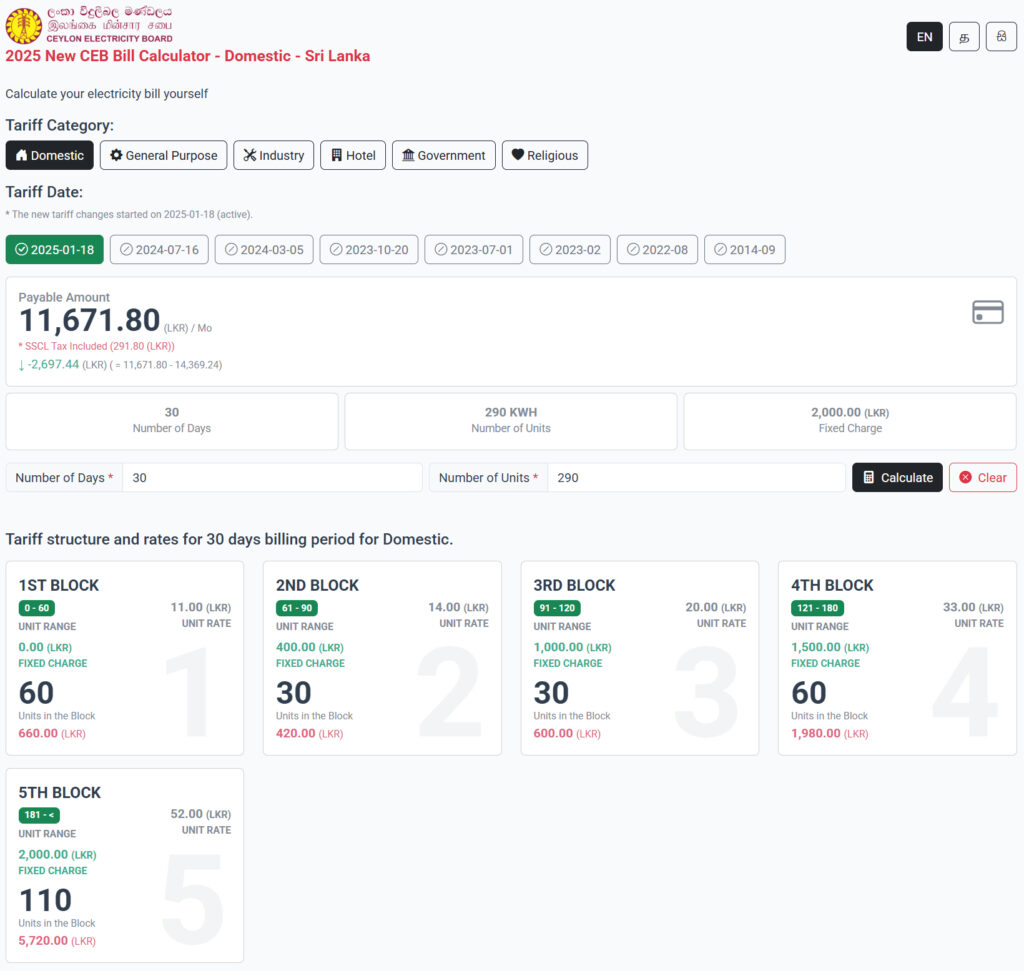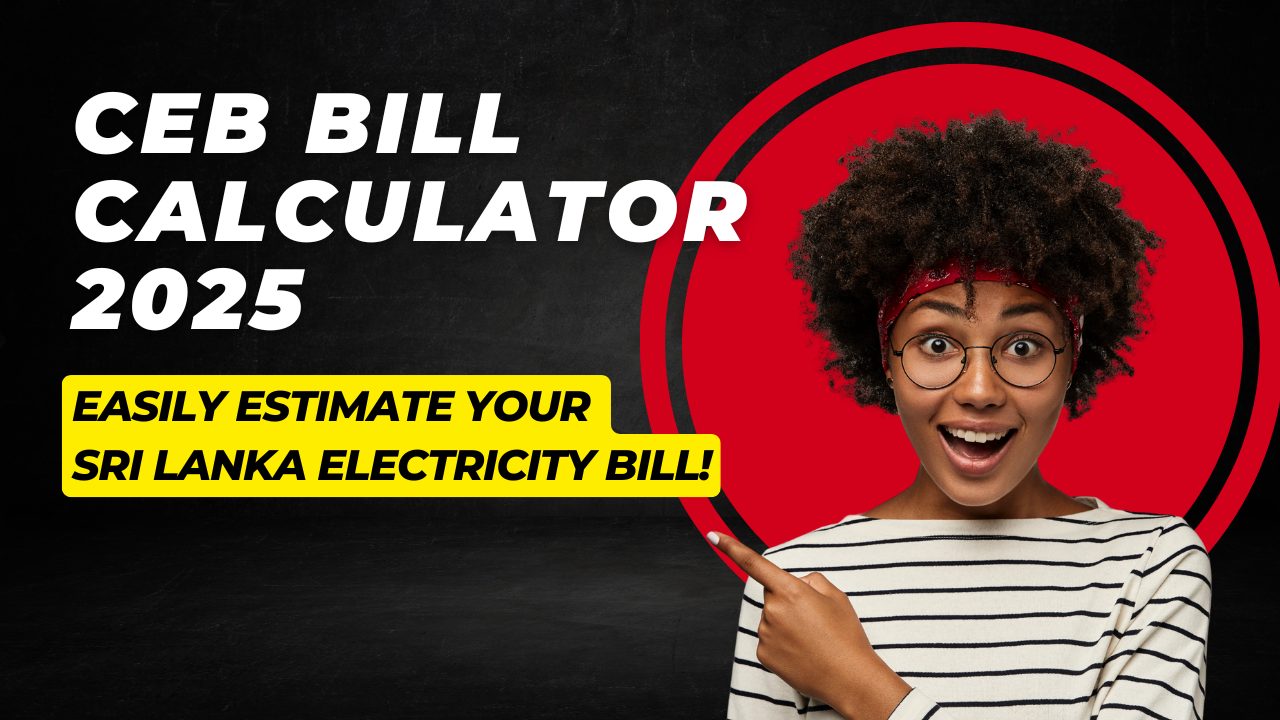Electricity bills are a major monthly expense for households and businesses in Sri Lanka. Understanding how your electricity usage translates into costs can help you manage your consumption efficiently. Use our interactive CEB Bill Calculator below to quickly estimate your electricity costs based on the latest 2025 tariffs.
CEB Bill Calculator (2025 Tariffs)

Calculator Features:
- Input: Monthly electricity consumption (in kWh).
- Category Selection: Domestic, Commercial, Industrial, Government, etc.
- Output: Estimated fixed charge, unit charges per slab, total energy charge, applicable SSCL tax, and total estimated bill.
- Accuracy: Uses the latest CEB tariff rates for 2025.
Disclaimer: The calculations provided are estimates based on the latest publicly available CEB tariff rates as of May 2025. Actual bills may vary slightly due to minor adjustments, specific meter conditions, and other factors. For the most current official tariffs, please refer to the Ceylon Electricity Board (CEB) website.
What is the CEB Bill Calculator?
The CEB bill calculator is an online tool that enables consumers to estimate their monthly electricity charges. By inputting your electricity consumption (in kWh), the calculator applies the latest tariff rates set by the Ceylon Electricity Board to generate an approximate bill amount. This tool is useful for households, businesses, and industrial users who want to plan their electricity expenses in advance.
Our MicroJCode CEB Bill Calculator, available right here on this page, provides a quick and accurate estimate of your electricity bill.
How to Use This CEB Bill Calculator
Using this CEB bill calculator is simple and requires only a few inputs:
- Enter Your Monthly Electricity Consumption: Input the total electricity consumption in kilowatt-hours (kWh) based on your meter reading.
- Select Your Customer Category: Choose whether you are a domestic, commercial, industrial, or government consumer.
- View Your Estimated Bill Below: The tool will instantly display the estimated electricity bill, including fixed charges, energy charges, and other applicable taxes.
Understanding CEB Electricity Tariffs in Sri Lanka
CEB follows a tiered tariff system, where charges vary based on usage. Here’s a breakdown of the latest 2025 domestic electricity tariff structure:
Domestic Tariff Rates for 30 Days (as of May 2025)
- 0 – 60 kWh: Rs. 11.00 per unit
- 61 – 90 kWh: Rs. 14.00 per unit
- 91 – 120 kWh: Rs. 20.00 per unit
- 121 – 180 kWh: Rs. 33.00 per unit
- Above 180 kWh: (Ensure you include this slab if applicable, as it’s common for tiered systems)
Apart from unit charges, the CEB bill also includes:
- Fixed Charges: E.g., Rs. 1,500.00 per month (varies by category and consumption slab)
- Social Security Contribution Levy (SSCL) Tax: Applicable government tax included in the final bill.
- Fuel Adjustment Charge: If applicable (less common now, but good to acknowledge).
Factors Affecting Your Electricity Bill
Several factors influence your electricity bill in Sri Lanka:
- Appliance Usage: High-energy-consuming appliances like air conditioners, refrigerators, and water heaters contribute significantly to your bill.
- Time of Use: While not universally applied to all domestic tariffs, some commercial or industrial tariffs may have peak-hour charges.
- Inefficient Appliances: Old and inefficient electrical devices consume more power, increasing your costs.
- Seasonal Variations: Increased use of fans and air conditioners during hotter months can lead to higher consumption.
Tips to Reduce Your CEB Electricity Bill
Reducing electricity costs doesn’t require drastic changes; small adjustments can make a big difference. Here are some practical energy-saving tips:
1. Use Energy-Efficient Appliances
- Switch to LED bulbs instead of incandescent ones.
- Use inverter air conditioners and refrigerators that consume less electricity.
2. Unplug Devices When Not in Use
Many appliances continue to consume power when plugged in, even if turned off (phantom load). Unplug chargers, TVs, and kitchen appliances when not in use.
3. Optimize Cooling and Heating
- Set your air conditioner temperature to 24-26°C for optimal efficiency.
- Use ceiling fans to distribute cool air, allowing you to set the AC to a slightly higher temperature.
4. Reduce Peak Hour Consumption
Avoid running high-energy-consuming devices during peak hours when electricity demand is highest (e.g., typically early evening).
5. Conduct Regular Maintenance
- Clean air conditioner filters regularly.
- Service refrigerators and other heavy appliances to maintain efficiency.
Benefits of Using the CEB Bill Calculator
The CEB bill calculator is not just about estimating costs—it provides numerous advantages:
- Budget Planning: Helps in financial planning by providing an estimate of upcoming electricity costs.
- Comparing Consumption: Allows consumers to track their energy consumption patterns and adjust accordingly.
- Awareness of Tariff Changes: Keeps consumers informed about the latest electricity tariffs and any regulatory changes.
- Encourages Energy Efficiency: By seeing the direct cost impact, users are encouraged to reduce unnecessary power usage.
Common Questions About the CEB Bill Calculator
- Is the CEB bill calculator accurate? The CEB bill calculator provides an approximate estimate based on standard tariff rates. Actual bills may vary due to taxes, surcharges, and other adjustments. It’s designed to give you a very close understanding.
- Where can I find my monthly electricity usage? You can check your electricity meter reading or refer to your previous CEB bill for past consumption data.
- Does the calculator work for all customer categories? Yes, our CEB bill calculator allows you to input for domestic, commercial, and industrial categories, among others.
- Can I reduce my bill using the calculator? The tool itself won’t reduce costs, but it helps you understand how consumption affects your bill. By seeing the impact of higher or lower kWh usage, you can make informed energy-saving decisions.
Conclusion
Managing your electricity costs effectively starts with understanding your usage. The CEB bill calculator in Sri Lanka is an essential tool for consumers to estimate their monthly electricity expenses, plan their budget, and adopt energy-saving habits. By following simple electricity-saving tips, you can significantly lower your bill while contributing to a more sustainable environment.
Ready to estimate your bill and take control of your electricity costs? Scroll up to use our interactive CEB Bill Calculator now!

Leave a Reply